Introduction, Specifications, and Pricing
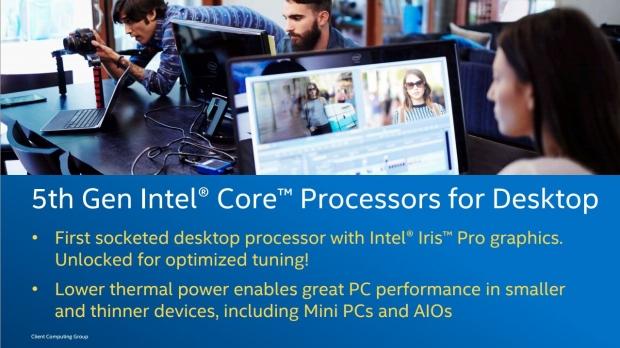
Turn back the clock to November 2012. Outlook in the PC DIY community was grim, everyone was waiting in anticipation as rumors started to surface that the end of the socketed desktop CPU was growing near. Many thought that if Broadwell was to be BGA only, then all following CPUs would also be the same way. The community loudly protested this news, and Intel listened. The i7-5775C and 5675C aim to answer the call for a socket LGA1150 Broadwell CPU. To top things off, Intel decided to add its top of the line Iris Pro graphics to both SKUs.
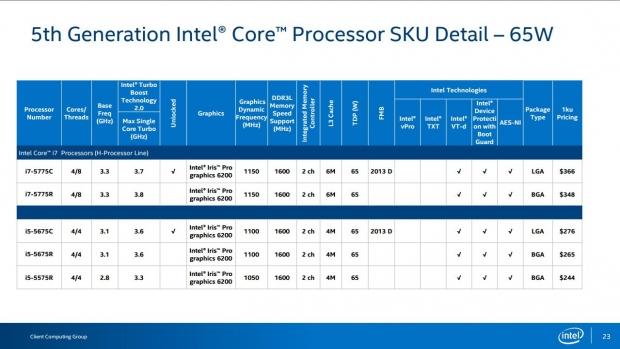
In my opinion, Broadwell was always a bit misunderstood. Intel realized that they needed to realign their assets to take greater advantage of the mobile market, and to do that they needed to start building more power efficient and mobile-friendly CPUs. It's one reason that Haswell and Broadwell both carry the integrated silicon voltage regulator, otherwise known as the fully integrated voltage regulator (FIVR). Broadwell is a perfect example of a CPU designed for the mobile segment and supercharged like a race car to fit into the desktop. Instead of increasing performance within the same thermal and power limits as the previous generation, Intel looked to increase power efficiency within the same performance envelope. In fact, low-powered Broadwell SKUs have been in mobile devices and SFF PCs for many months now, and it was only a month ago at Computex that Intel announced the SKUs pictured above.
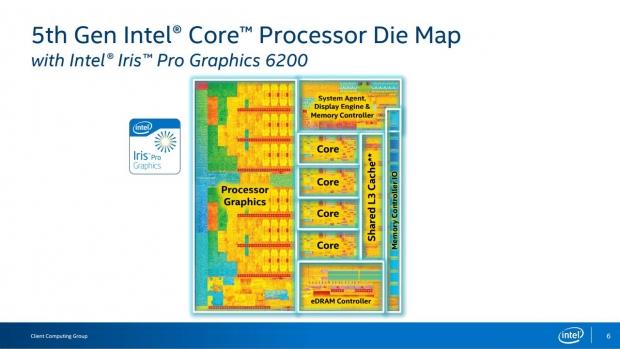
To help transition into smaller lithographic nodes, Intel has their Tick-Tock model where a Tock is a new microarchitecture and a Tick is basically a node shrink of the previous microarchitecture. Haswell was the Tock at 22nm and Broadwell is the Tick at 14nm. Broadwell is more than just your typical Tick; for starters it is the first time that Intel has put Iris Pro graphics and unlocked overclocking in the same package. The 5775C and 5675C also introduce 128MB of overclockable eDRAM, known as Crystal Well, working as L4 cache primarily for the integrated Iris Pro graphics.
As you can see, the die map reveals that Broadwell focuses heavily on the GPU side of things, allocating more die space and quicker memory access to integrated graphics. From what I have seen in my past reviews with SFF PCs using Broadwell, Intel has focused heavily on power reduction. The die shrinks and optimizations have led to greatly reduced power consumption without greatly impacting processing power. Let's see how Broadwell does on the desktop.
Specifications
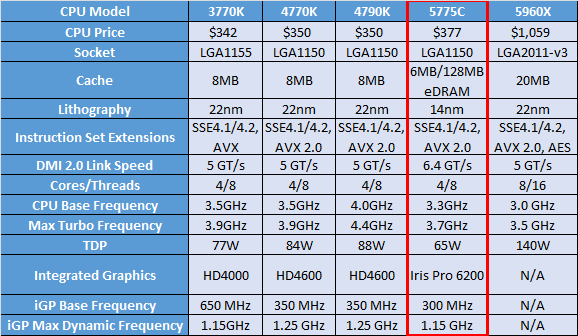
The 5775C and 5675C both work in the LGA1150 socket, but Intel recommends the Z97 chipset if you decide to overclock, especially if you want to use XMP. The 5775C has a base and turbo clock speed 200MHz lower than the 4770K and 3770K, but at the same time it carries significantly better integrated graphics and a lower TDP. The 5775C also has less shared cache at 6MB compared to 8MB, but it carries 128MB of eDRAM that operates at 1800MHz. You can start to see the mobile influence on Broadwell and how Intel modified and improved on other features to ready the 5775C for the desktop.
Pricing
Intel's suggested price for the i7-5775C is $377 while its counterpart, the i5-5675C, will cost $277. The 5675C has 2MB less cache and no hyper threading when compared to the 5775C. The 5775C is a little more expensive compared to Haswell offerings; the extra cost is presumably for the better integrated graphics.
CPU and Test Setup
Intel Core i7-5775C
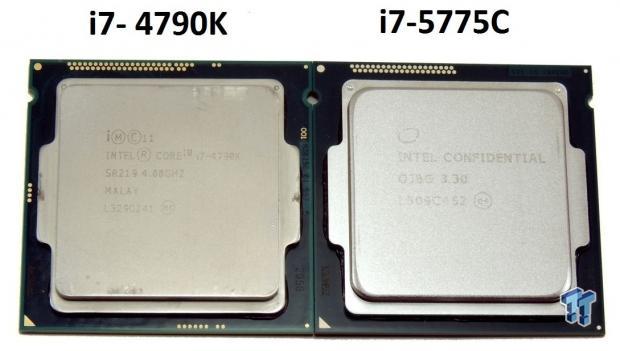
This is a side by side of the i7-5775C on the right and the i7-4790K on the left. Both CPUs work in LGA1150 socket motherboards, however the Z97 chipset is recommended for the Broadwell SKU and XMP is only supported on Z97.
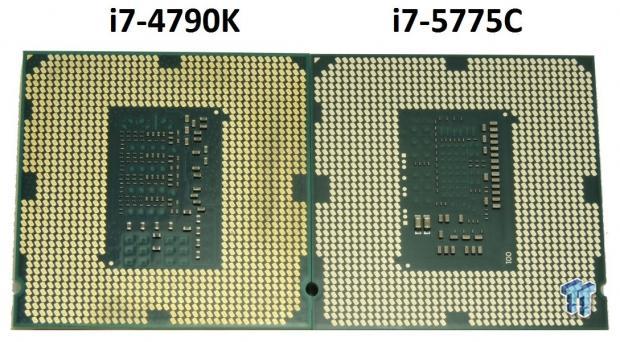
The bottom of each CPU is a bit different, the SMDs are positioned differently. While the CPUs have an almost identical pin out, two pins, LGA Ball #s "K9" and "Y7" have changed. Previously Intel had the signal names, "FC_K9" and FC_K7" on pins "K9" and "Y7" for Haswell CPUs. Those two pins are now "VCCST" on pin "K9" and "VCCST_PWRGD" on pin "Y7" for Broadwell CPUs.
VCCST is the "sustain voltage for the processor in standby" as described by the Desktop 5th Gen. Intel Core Processor Family Datasheet. Power improvements have been made to Broadwell for very low power consumption standby modes. I assume that VCCST perhaps circumvents the FIVR, or provides only partial power to some specific area of the FIVR so that the entire FIVR doesn't need to be turned on.
Test Systems
For this article, I went back and retested four processors in addition to the 5775C, that means all the benchmarks run in this review have been done so with the same drivers, OS, and benchmark software versions. All LGA1150 CPUs were tested on the same motherboard.
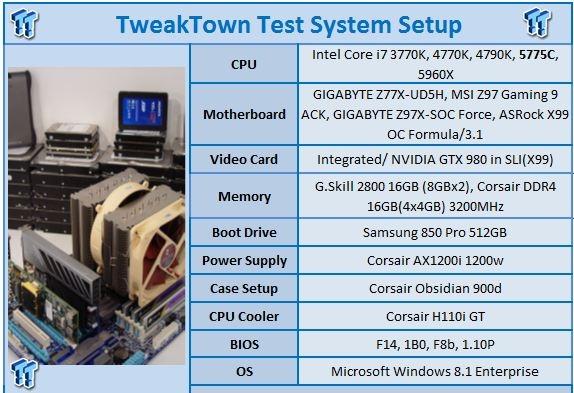
Z97 motherboards have been on the market for a while now, but Broadwell will require a BIOS update. Some BIOSes will have new options for eDRAM overclocking. For this article, I used three motherboards, one X99 and two Z97. I used the ASRock X99-OC Formula/3.1 for the X99 results, the GIGABYTE Z97X-SOC Force to test all the LGA1150 CPUs at stock and at 4.0GHz, and the MSI Z97 Gaming 9 ACK for exploring overclocking.
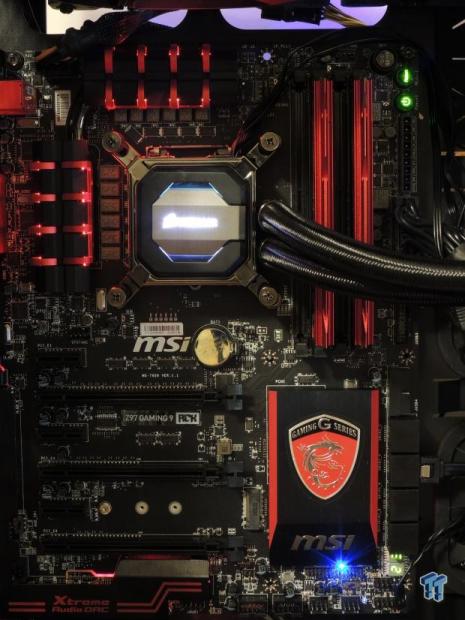
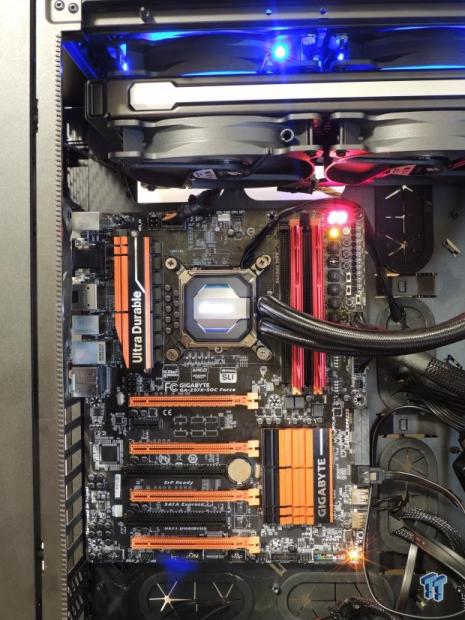
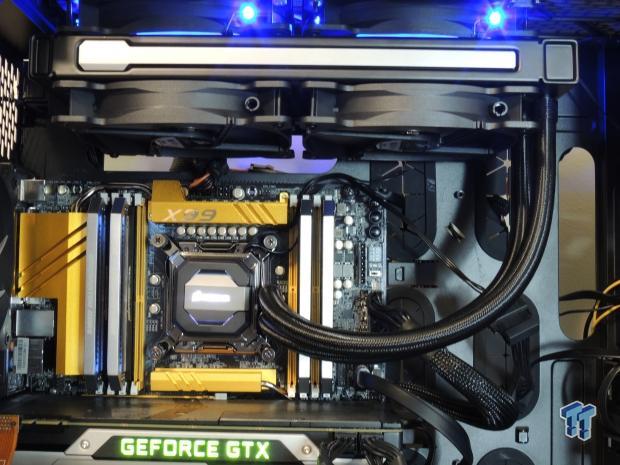
For the benchmarks, I decided that out of the box performance was just as important as clock for clock performance. I decided to test all the CPUs at stock, but also at a 4GHz overclock with 2133MHz memory clock with the same timings. I was able to apply the same VCore of 1.27 to accommodate all the LGA1155/LGA1150 CPUs for the overclock to 4GHz, which helped standardize the power consumption results. I also set the Cache/Uncore ratio to 33x.
Out of the Box Performance: CINEBENCH, PCMark 8, wPrime
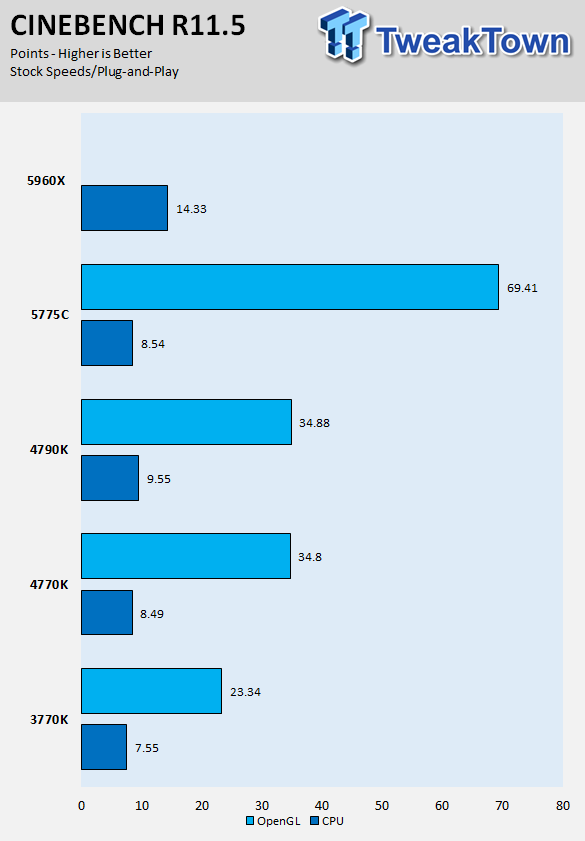
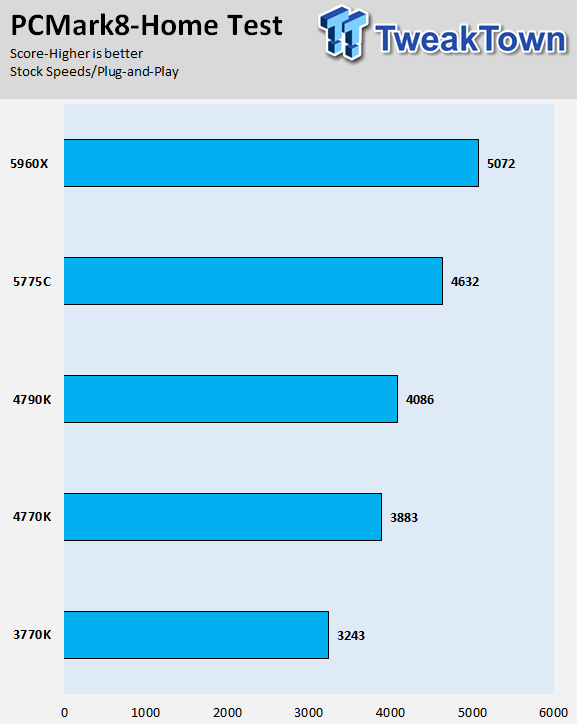
PCMark 8: Microsoft Office Test
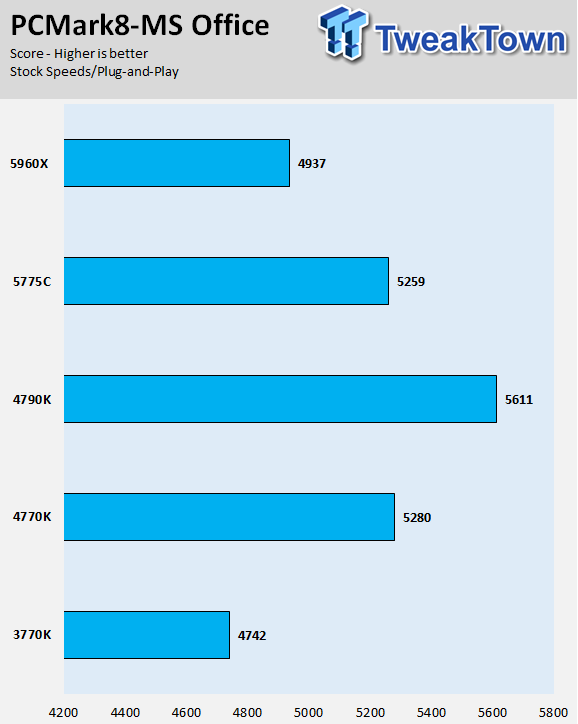
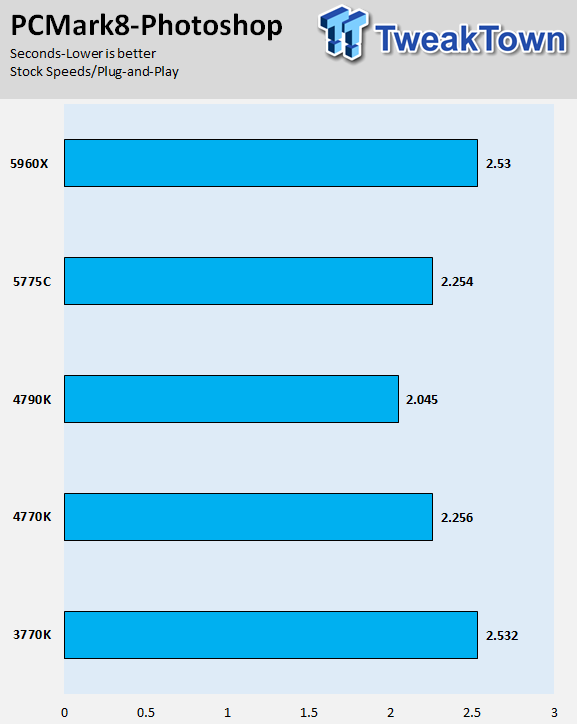
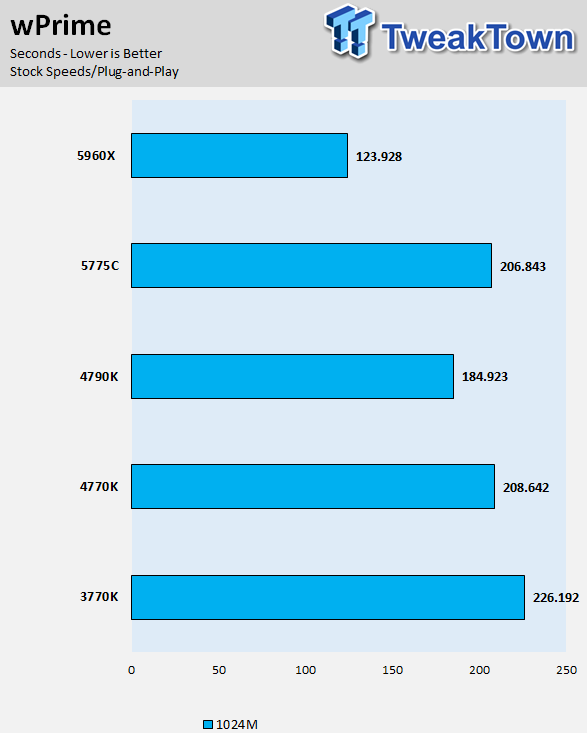
CINEBENCH's OpenCL test uses the iGP of each CPU (excluding the 5960X), and shows the advantages of the Intel Iris Pro graphics compared to Intel's HD 4600. CINEBENCH scores for the CPU are pretty much where you would expect, with the 4790K in the lead because of the clock speed boost, but the 5775C isn't lagging too far behind.
PCMark Home also takes into account iGP when it runs its tests. The Microsoft Office test repeats tasks with Word, PowerPoint, and Excel and times how long it takes to complete the tasks. It is also quite dependent on clock speeds, and the 4790K with its 4.4GHz Turbo Boost really performs well. It is also worth noting how close the 5775C and 4770K are; the extra 200MHz base and Turbo on the 4770K really helps its performance, but the 5775C still holds its ground.
The PCMark 8 Photoshop test runs images through Adobe Photoshop, and spits out the score in seconds (lower is better) since I didn't run the entire Abode Suite. It's almost like the inverse of the MS Office test, with heavy dependence on clock speeds. The wPrime scores take into account multithreaded CPU performance, with little reliance on memory bandwidth, and the 5775C beats out the 4770K this time.
Out of the Box Performance: AIDA64 EE AES, FPU, GFLOPS, GIOPS, PhotoWorxx, and Memory
AIDA64 Engineer Edition is updated periodically, and these tests were done with the latest build.
However, AIDA64 is not optimized for Broadwell at this time, and a warning popped up periodically to remind me. That means that the Broadwell scores should improve when they update the benchmark, so some of these results will improve by a margin when AIDA64 updates its software.
AIDA64 Engineer Edition AES and Hash Tests
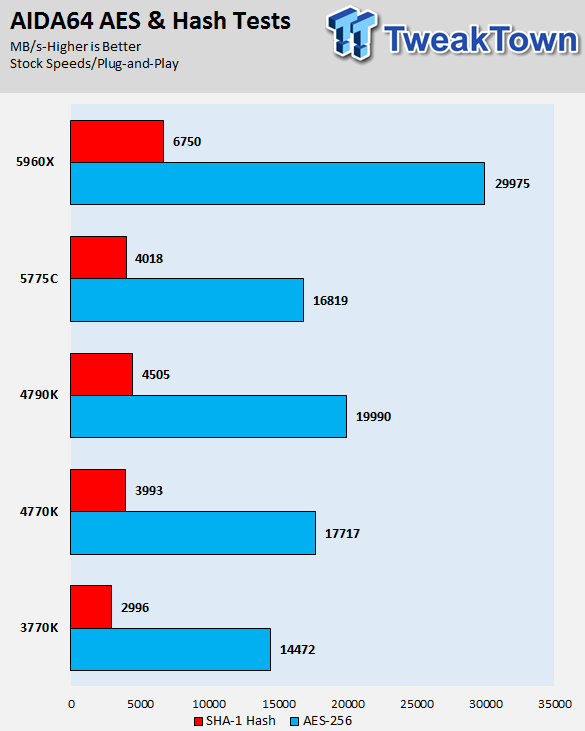
AIDA64 Engineer Edition GFLOPS and GIOPS Test
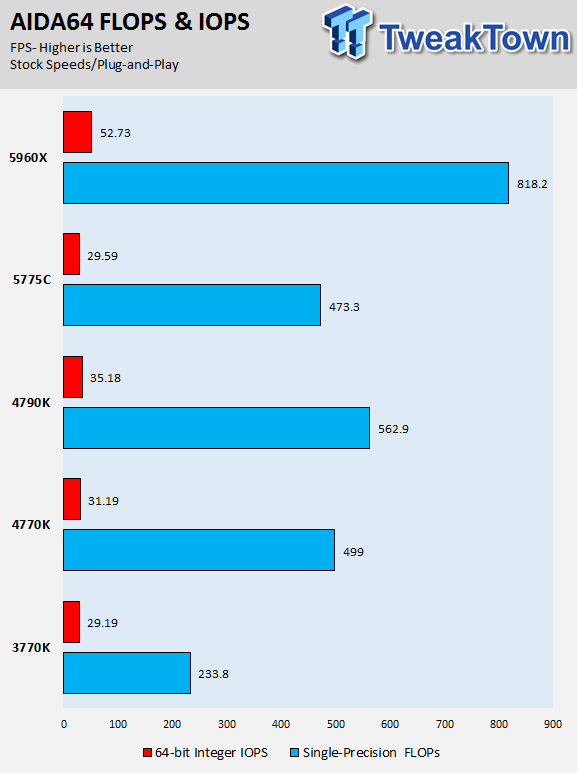
AIDA64 Engineer Edition FPU Tests
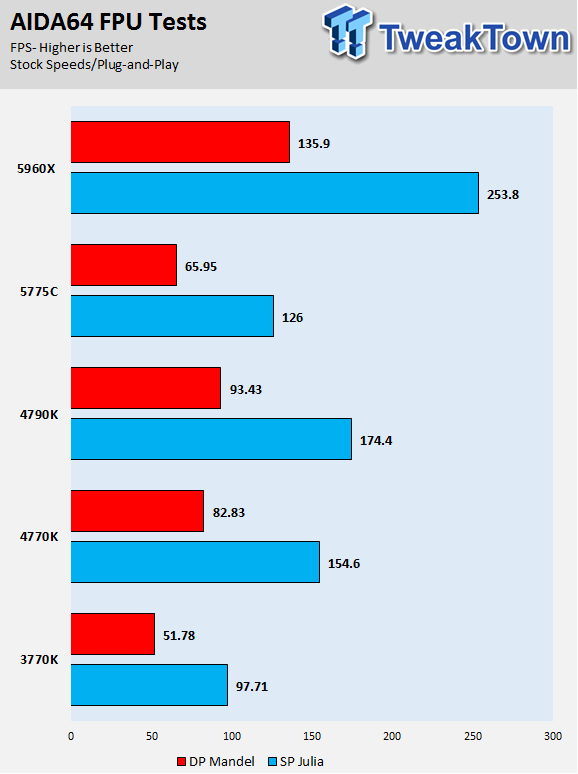
AIDA64 Engineer Edition PhotoWorxx Test
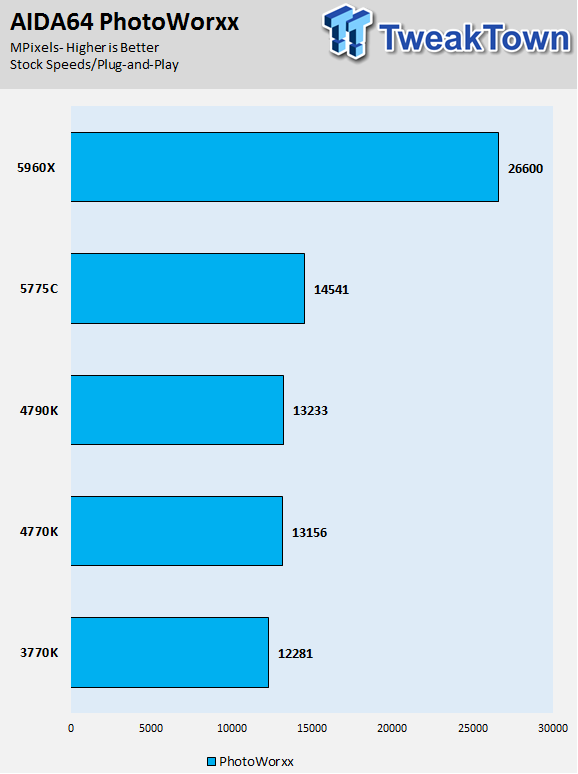
AIDA64 Engineer Edition Memory Bandwidth Test
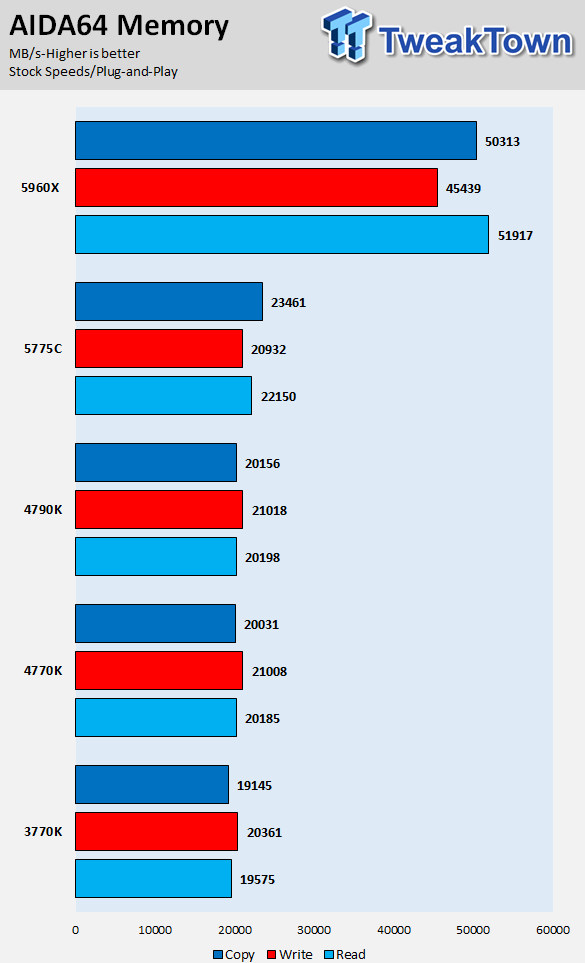
Even without the benchmark being optimized for the 5775C, it performed quite well against the 4770K.
A lot of these tests are dependent on CPU frequency, and that is one reason the 4790K does so well. The 5775C does best when everything is taken into account, such as memory and/or the iGP. In PhotoWorxx, the 5775C even beats out the 4790K. Memory bandwidth results show a pretty decent improvement in DRAM copy and read bandwidth.
Out of the Box Performance: Handbrake and Hybrid Video Transcoding, ScienceMark
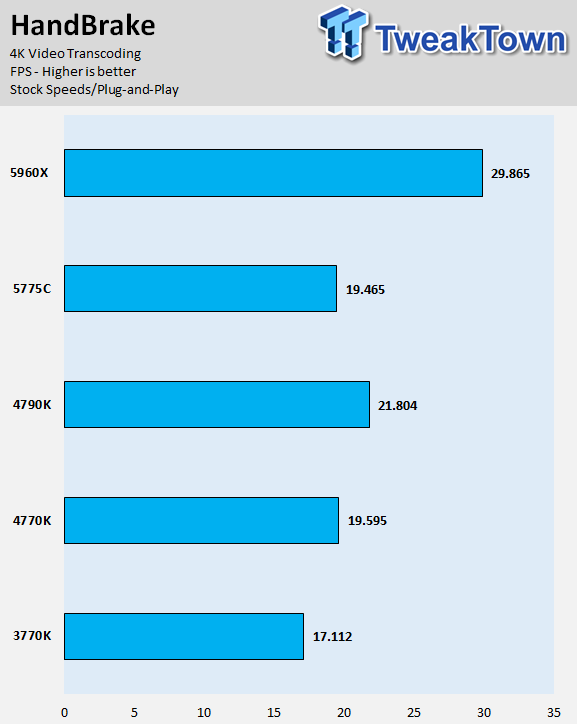
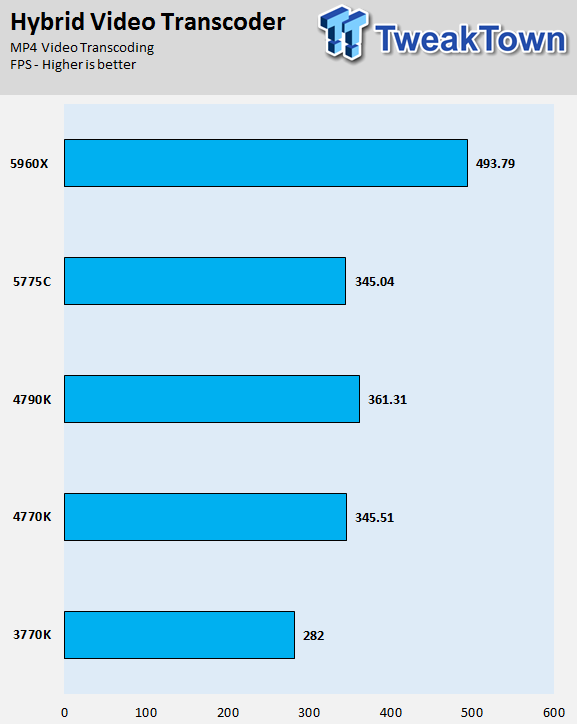
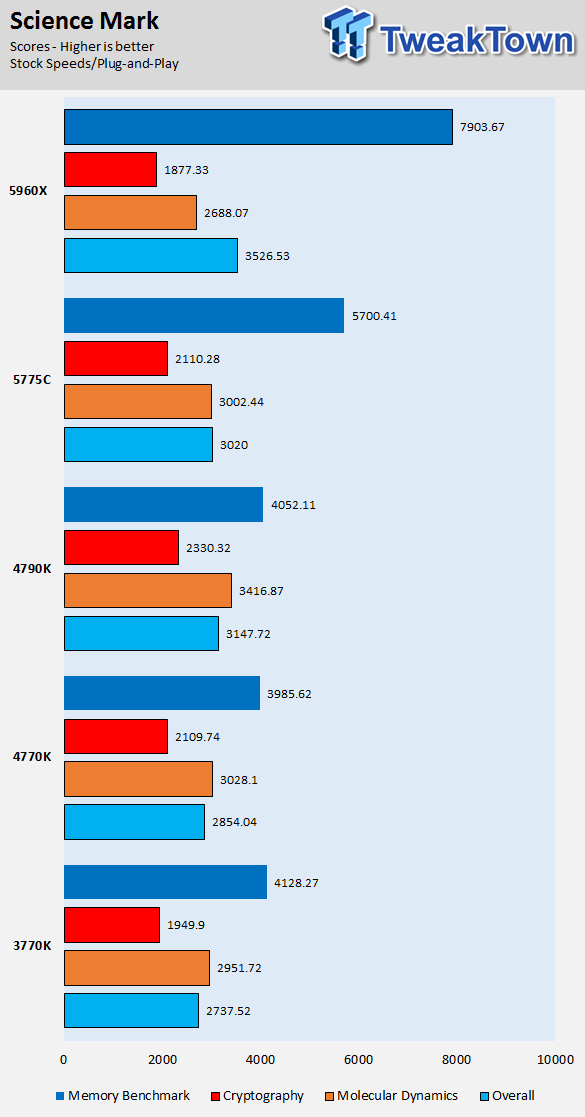
In HandBrake and Hybrid, the 5775C is head to head with the 4770K, even while it uses much less power, is 200MHz slower, and has 2MB less cache.
ScienceMark is interesting because of that huge memory bandwidth score; it gives a good overall impression of CPU and memory performance, even though it is quite an old benchmark.
Out of the Box iGPU Performance: GPGPU Memory, UNIGINE, ResidentEvil, LostPlanet, 3DMark
AIDA64 Engineer Edition: GPGPU Memory Bandwidth Test
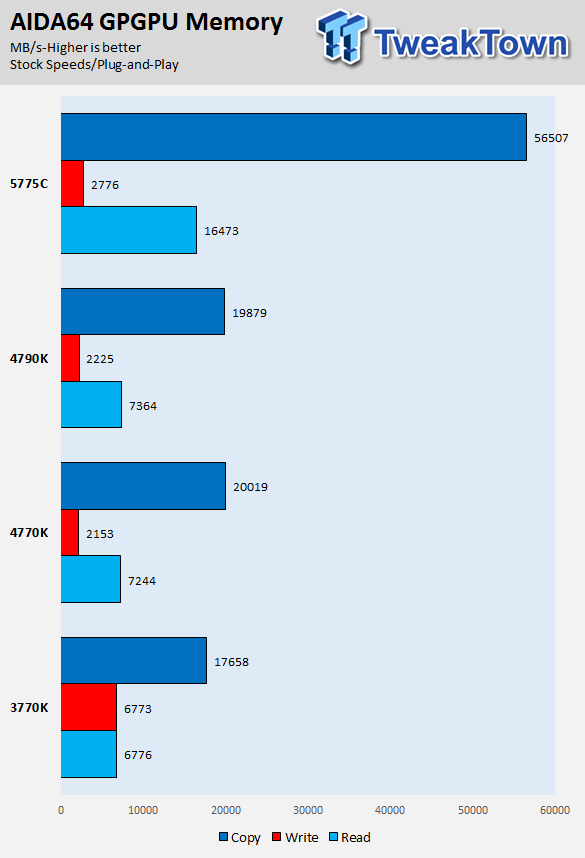
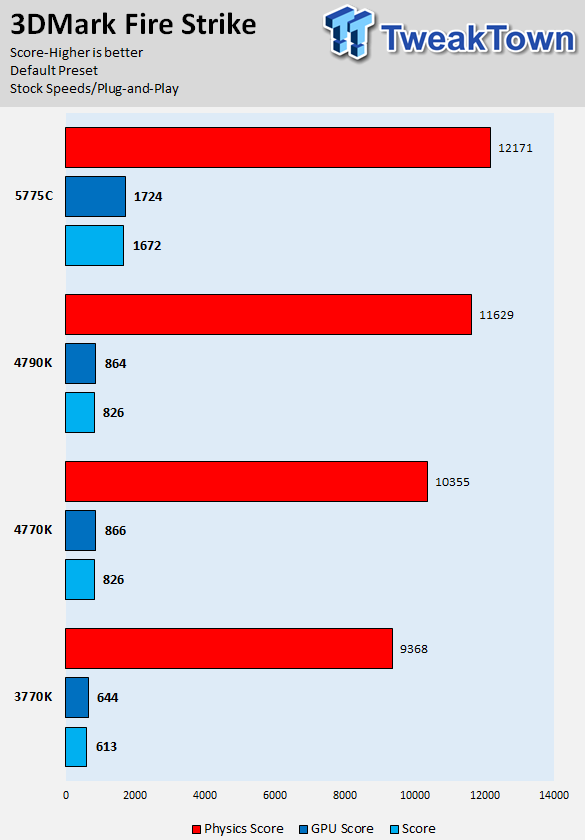
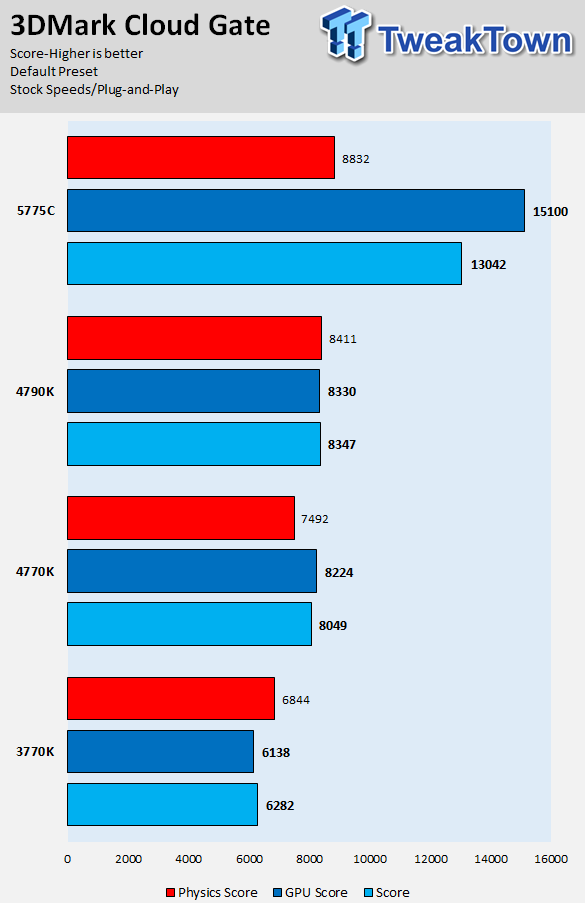
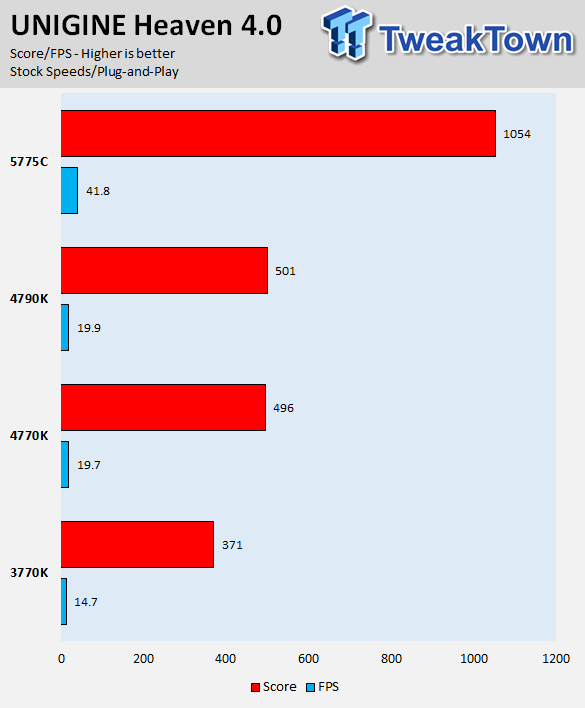
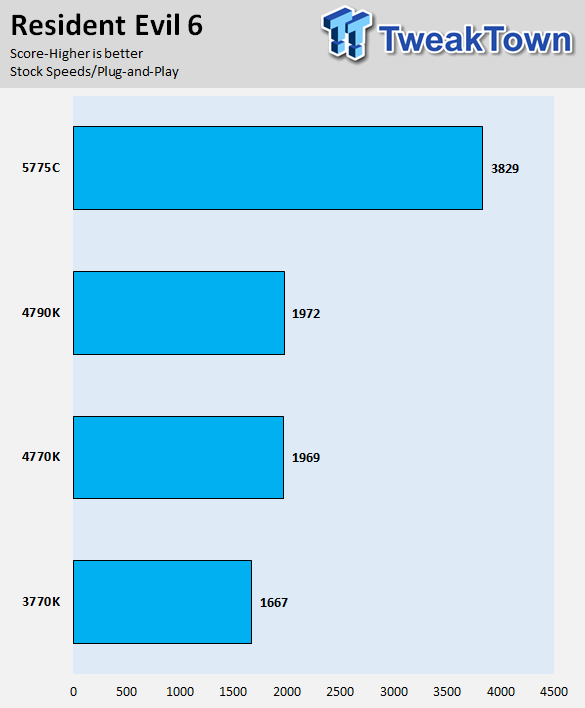
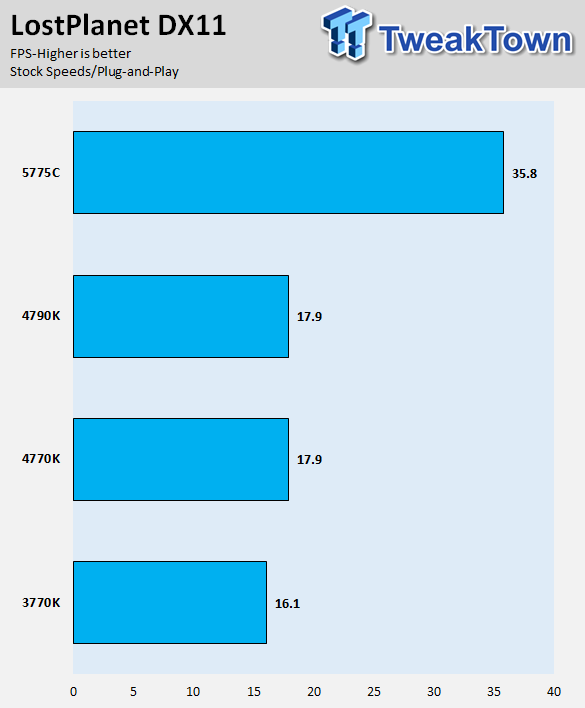
The 5775C really excels at anything iGP related. It is interesting to see those huge memory copy and memory read boosts because of the eDRAM. In the 3DMark benchmarks, the 5775C wins pretty much every single benchmark by a large margin, sometimes almost doubling the others in GPU scores and even overall score.
I was quite surprised to see that the 5775C's Physics scores were so high compared to the 4790K and 4770K, because that is mostly about the CPU. The Iris Pro 6200 can make some more recent titles playable on only integrated graphics, but it will take some time before it reaches the point where $200 discrete GPUs perform.
Clock for Clock Performance: CINEBENCH, PCMark 8, wPrime
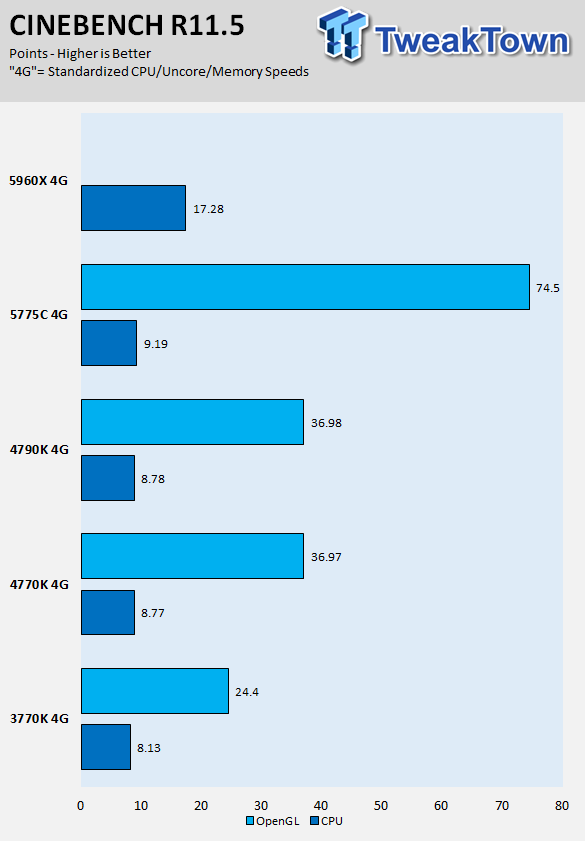
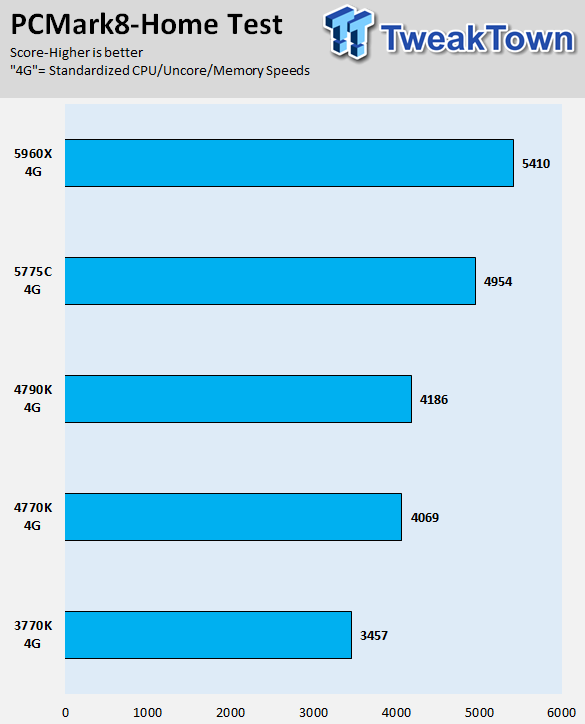
PCMark 8: Microsoft Office Test
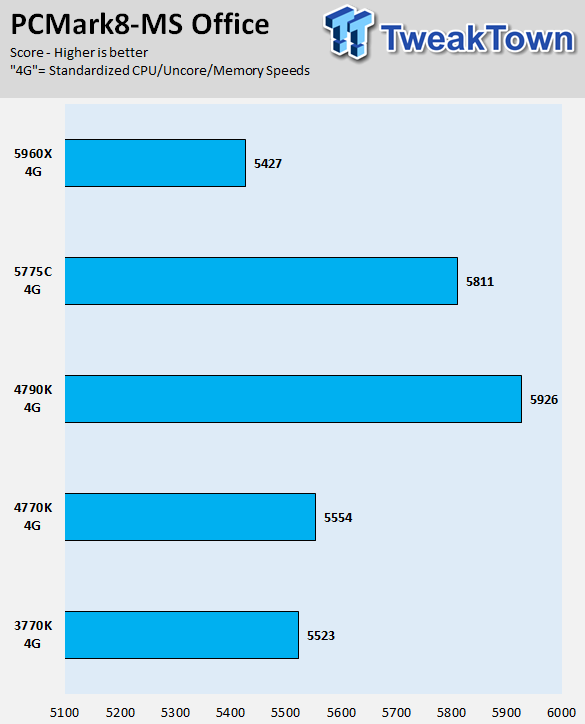
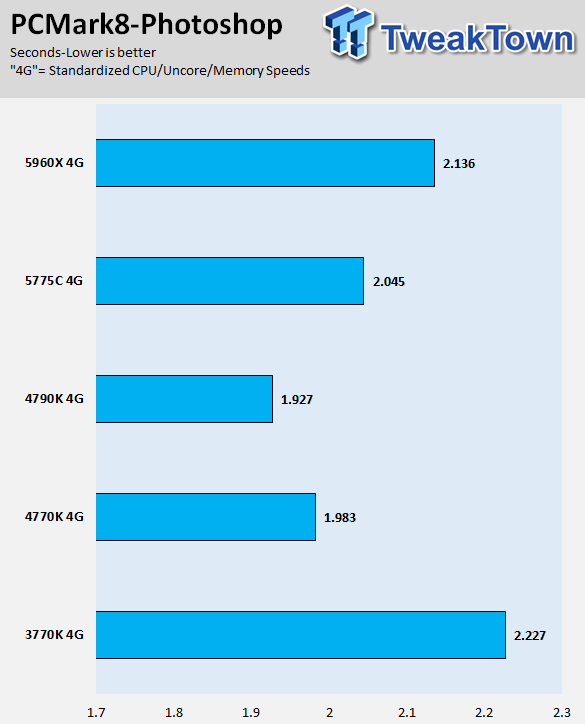
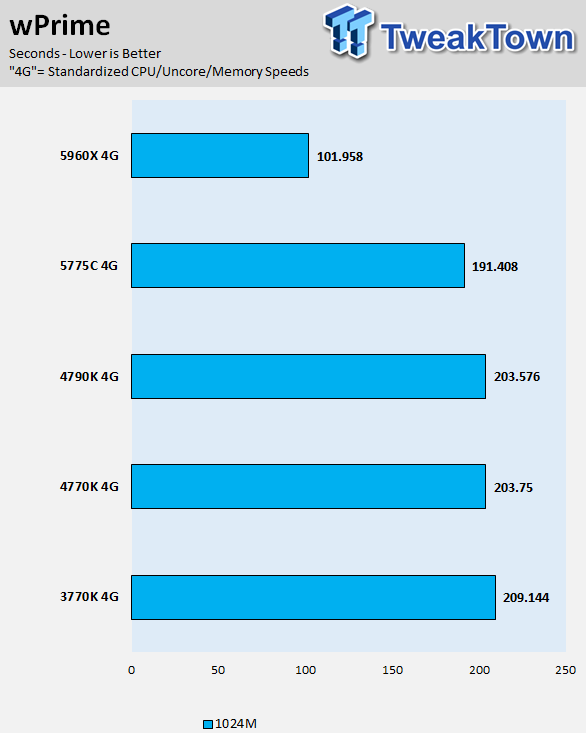
The clock for clock results are much more telling of the 5775C's true ability, especially since it is unlocked and 4GHz was quite easy to attain. In CINEBENCH, it not only takes the OpenCL crown, but also the CPU crown against the other CPUs (excluding the 5960X of course).
In PCMark 8 Home, it has a better lead than it did in the out of the box tests. In the PCMark MS Office test the 5775C has a lead over the 4770K, but in the PCMark Photoshop test, it is a bit slower. In wPrime, it beats out both the 4790K and 4770K.
Clock for Clock Performance: AIDA64 EE AES, FPU, GFLOPS, GIOPS, PhotoWorxx, and Memory
AIDA64 Engineer Edition is updated periodically, and these tests were done with the latest build.
However, AIDA64 is not optimized for Broadwell at this time, and a warning popped up periodically to remind me. That means that the Broadwell scores should improve when they update the benchmark, so some of these results will improve by a margin when AIDA64 updates its software.
AIDA64 Engineer Edition AES and Hash Tests
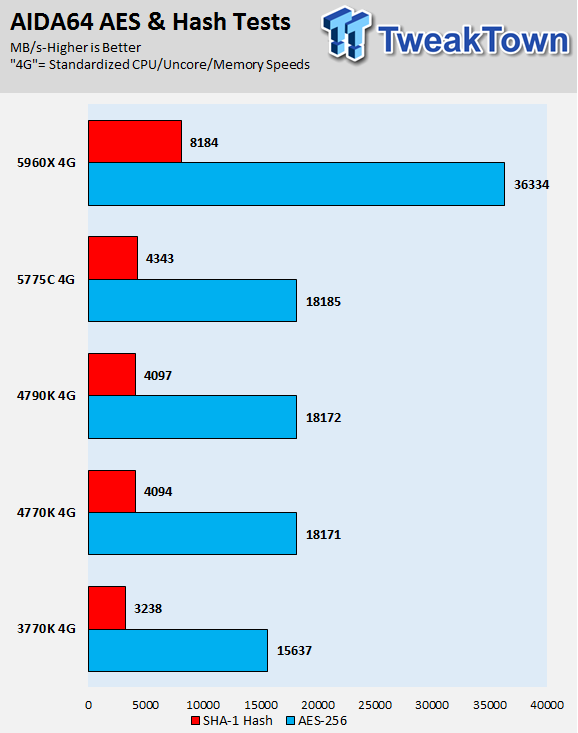
AIDA64 Engineer Edition GFLOPS and GIOPS Test
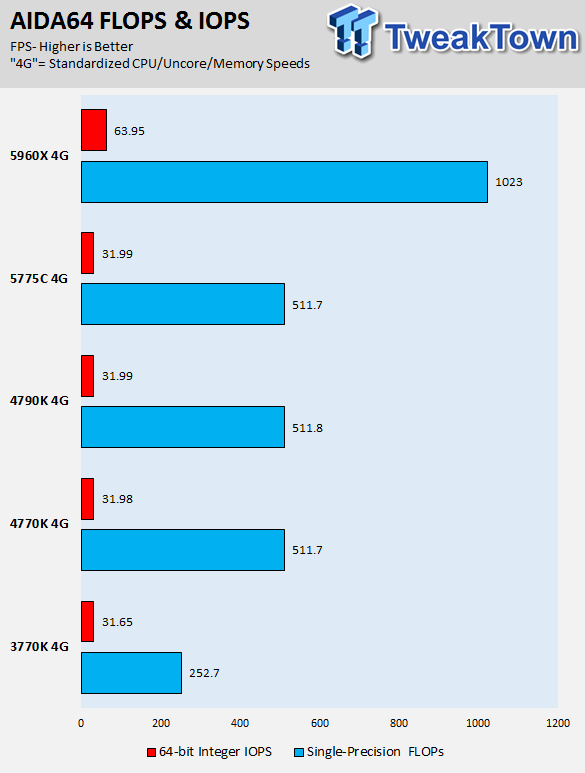
AIDA64 Engineer Edition FPU Tests
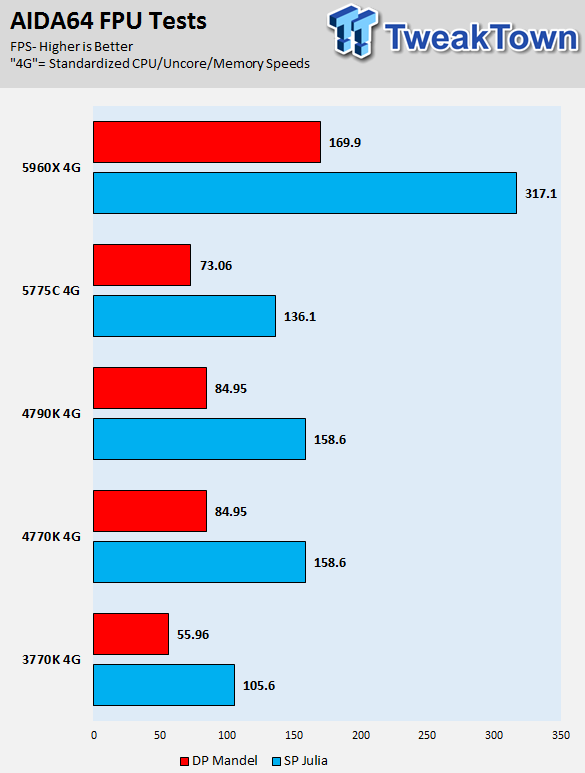
AIDA64 Engineer Edition PhotoWorxx Test
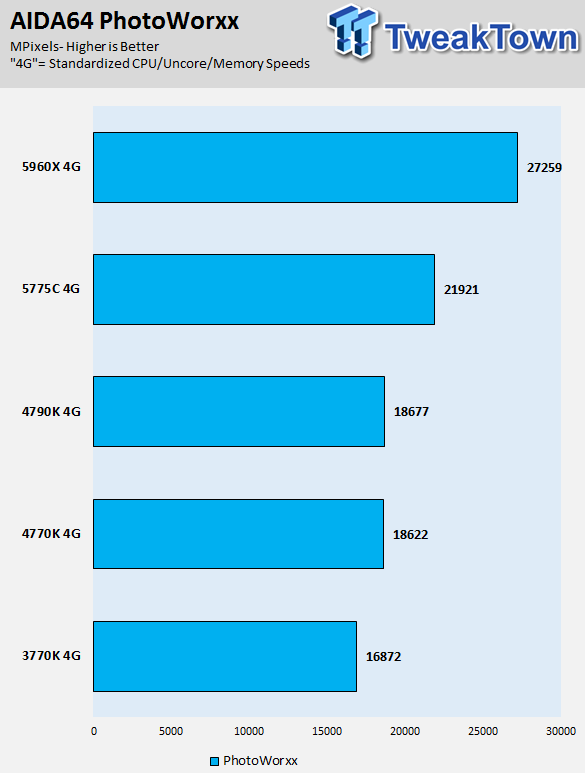
AIDA64 Engineer Edition Memory Bandwidth Test
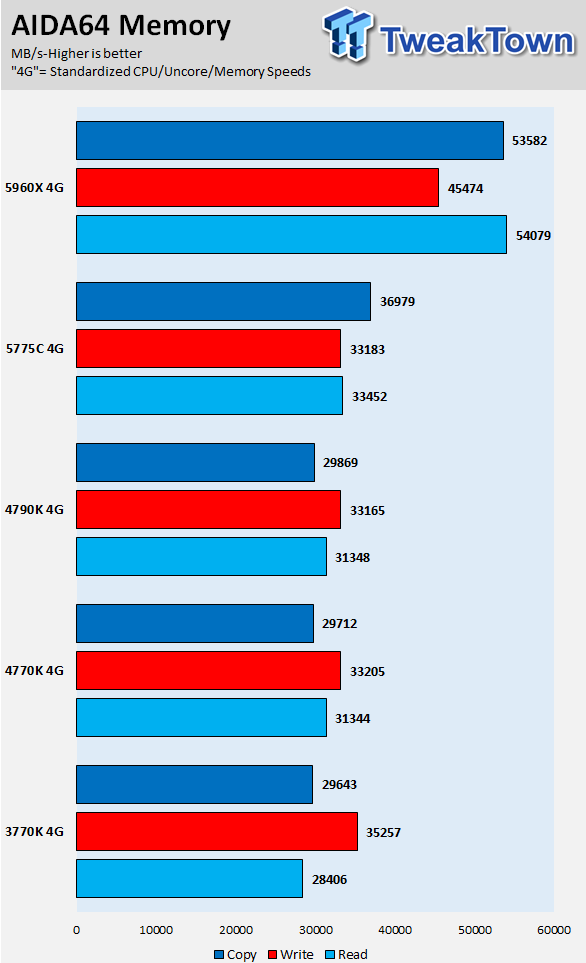
At the same speeds as the 4790K and 4770K, the 5775C takes the lead on AES, Hash, and PhotoWorxx. In the FLOPS and IOPS tests, all three CPUs are basically in a tie.
In the FPU tests the 4770K and 4790K lead, presumably because of their larger cache. The improvements to memory bandwidth are quite good with this slight overclock.
Clock for Clock Performance: Handbrake and Hybrid Video Transcoding, ScienceMark
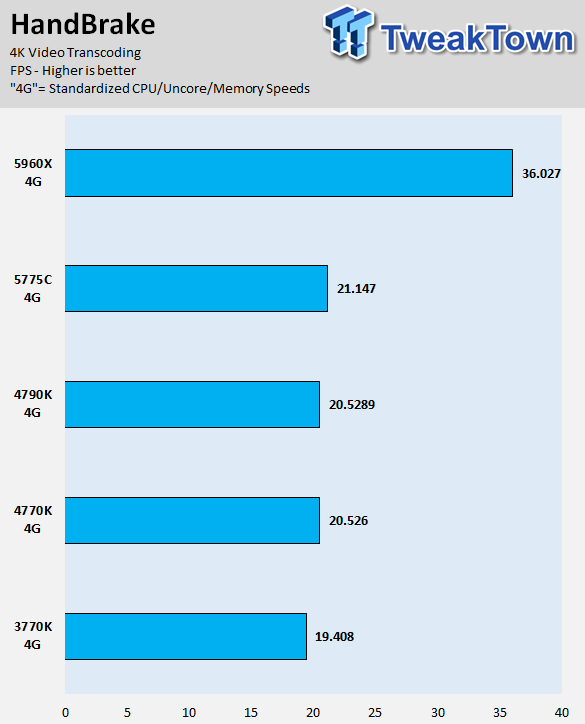
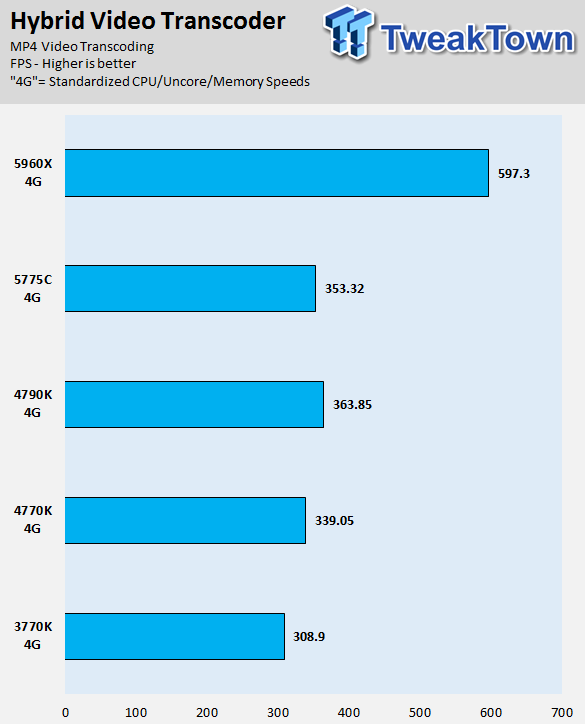
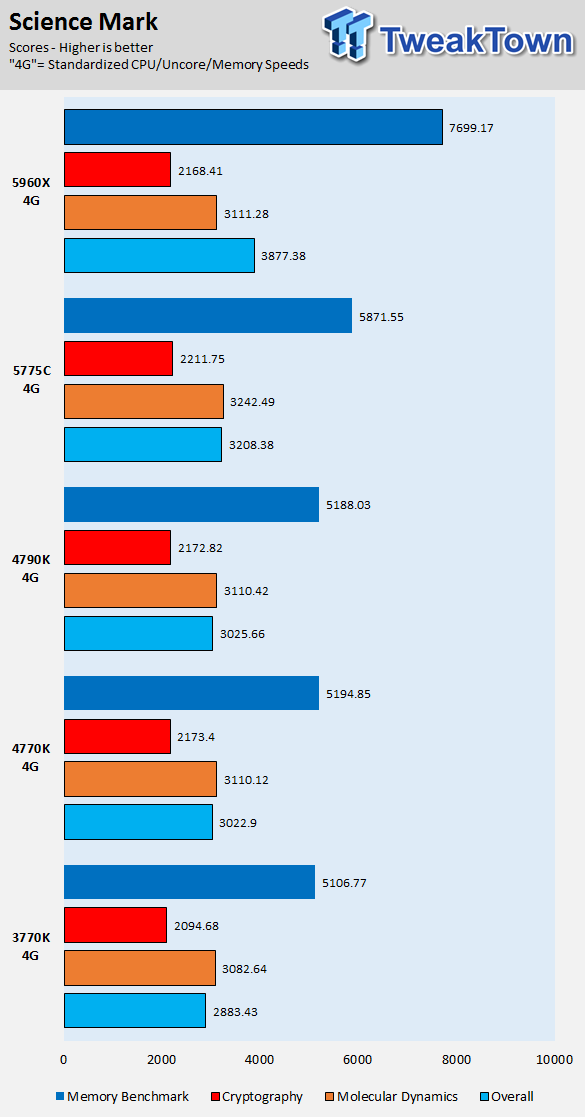
With a standardized clock, the 5775C is starting to regain some ground, especially in Handbrake.
In ScienceMark, Molecular Dynamics and Cryptography show good improvements.
Clock for Clock iGPU Performance: GPGPU Memory, UNIGINE, ResidentEvil, LostPlanet, 3DMark
AIDA64 Engineer Edition: GPGPU Memory Bandwidth Test
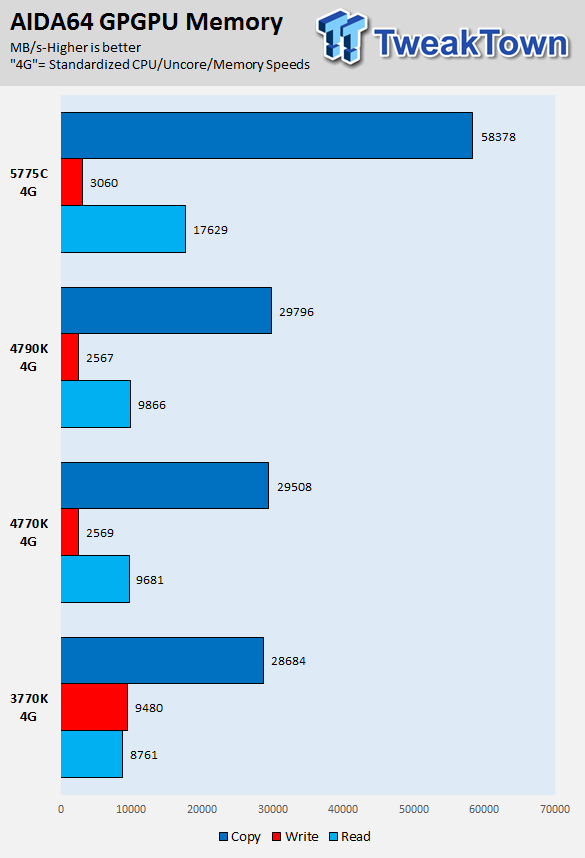
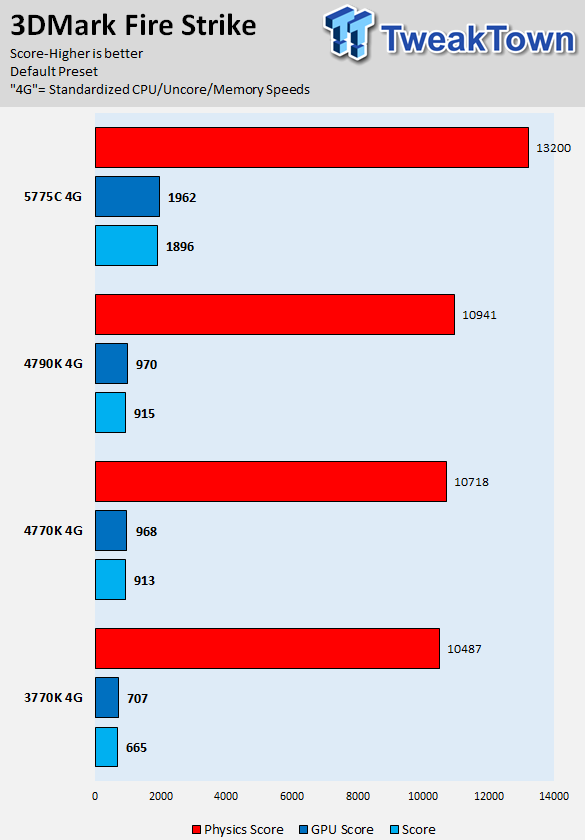
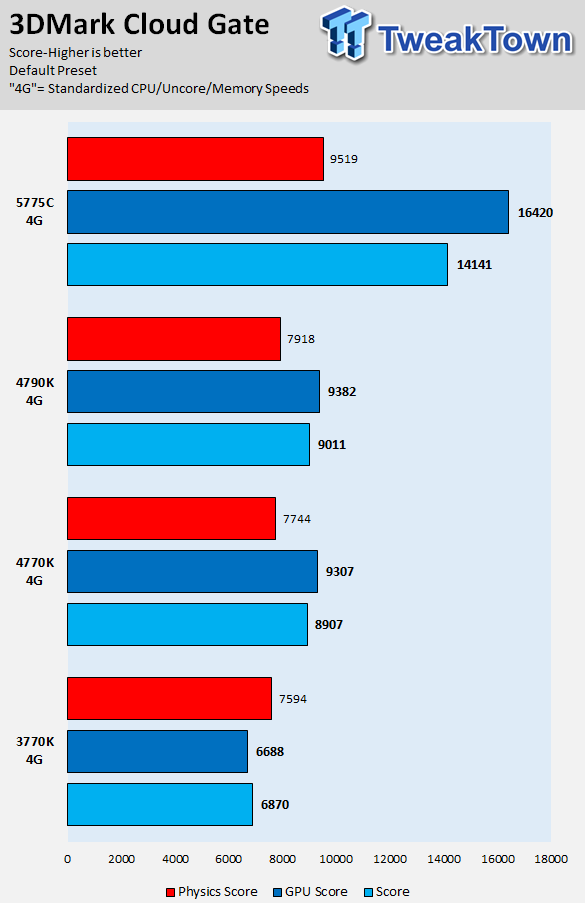
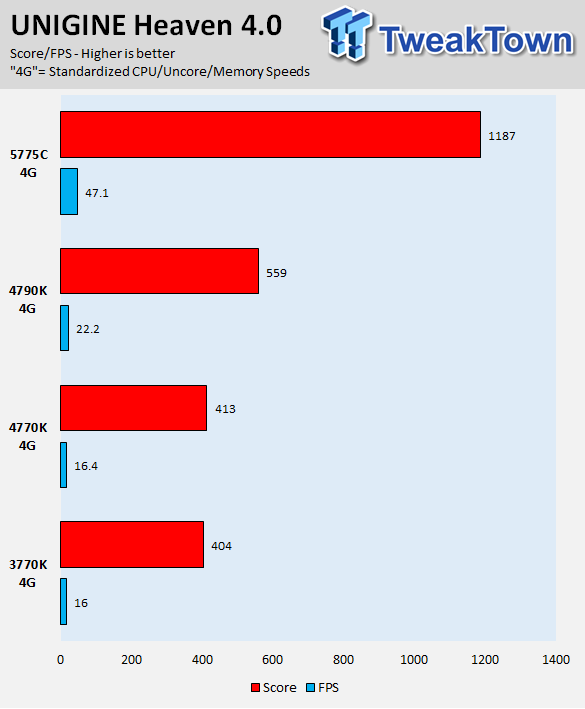
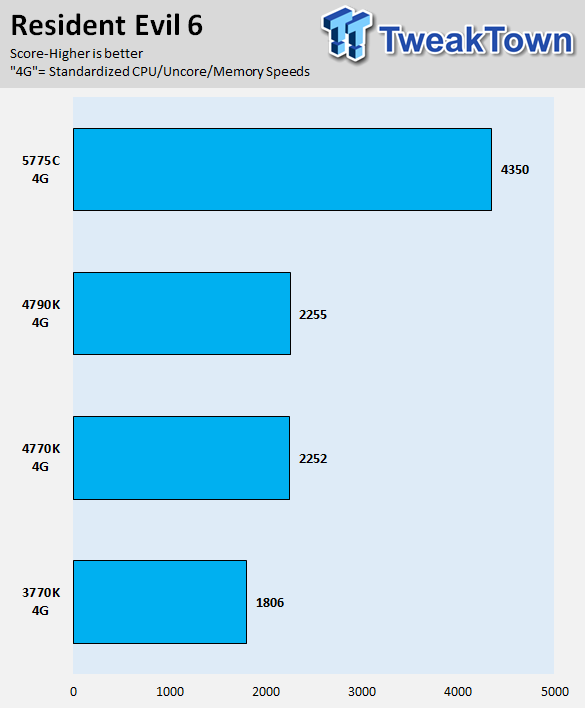
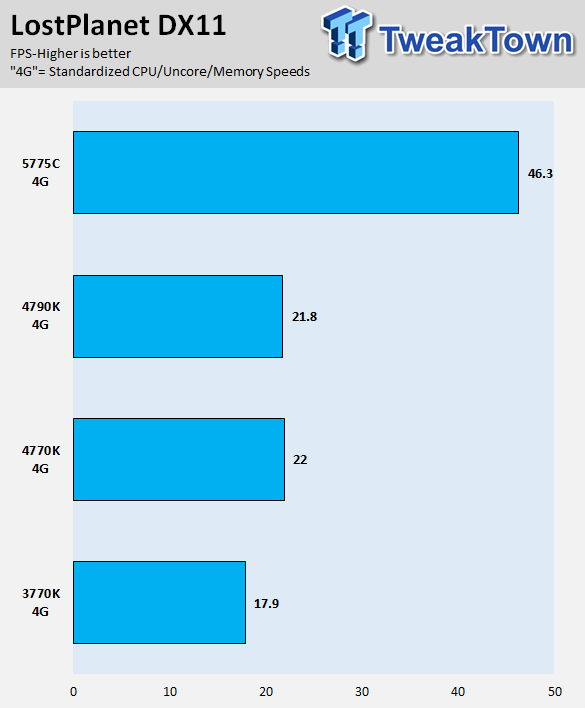
The 5775C still does very well against previous generation CPUs.
Overclocking and Power Consumption
Overclocking
Overclocking the 5775C can be simple or challenging depending on if you really want to tweak the iGP. I would think that most people who buy the 5775C will buy it for the integrated Iris Pro graphics, and while this part of the article doesn't really cover iGP overclocking, I will show you the eDRAM multiplier.
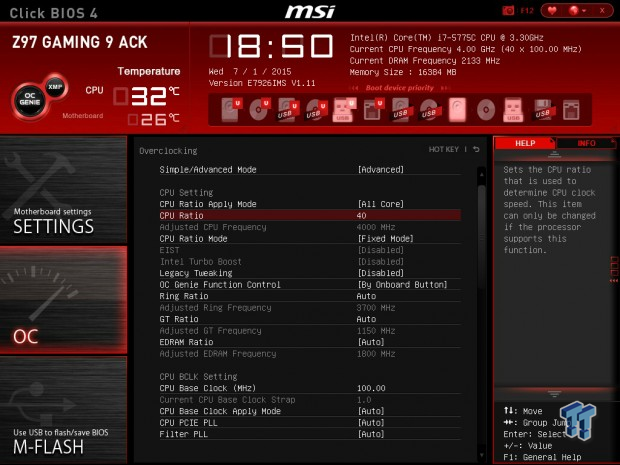
I used MSI's Z97 Gaming 9 ACK for this part of the article. I used BIOS 1.B because it had the eDRAM multiplier in it. If you haven't flashed your Z97 board's UEFI to one of the latest, then you probably won't have this option. Intel has been pushing for microcode updates for Broadwell and I think they will make even more of an impact in the future when they are implemented.
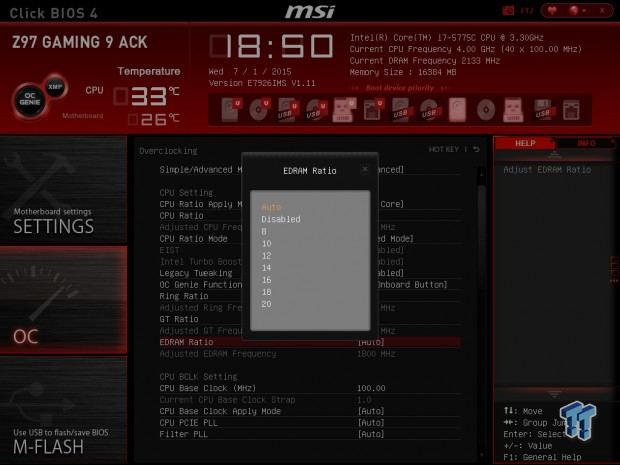
You can overclock the eDRAM by just engaging either the 1.25x or 1.66x BLCK multiplier as the eDRAM will use the BLCK for its eventual frequency, or you can chose a multiplier like those shown above. This also means you should be careful when overclocking with BLCK, because the iGP and eDRAM frequencies are also tied to the BLCK.
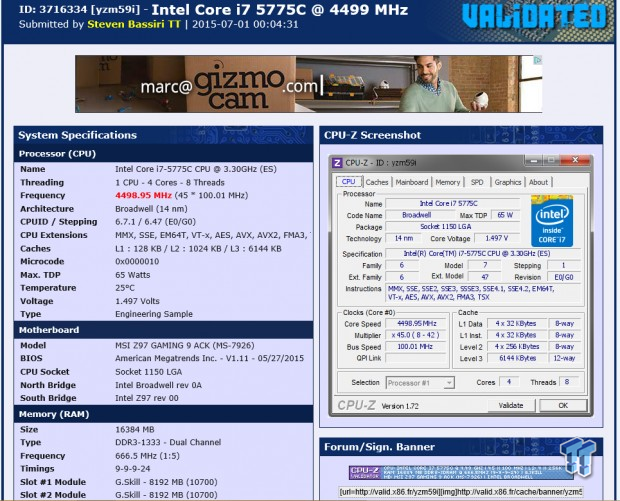
The maximum overclock I was able to achieve was 4.5GHz. This means it was stable enough to validate this overclock with CPUz, but I couldn't do much else without freezing. The eDRAM addition to the system could be one reason for the lower OC, as it's the new ingredient, but I found other limits as well. Overclocking the cache and memory isn't as easy as I am used to with the 4770K and 4790K. The CPU is also pretty sensitive to voltage, too high or too low and you might get issues. I found that an Input Voltage lower than 1.9v or higher than 2.15v would result in instability. I had to use 2.0-2.1v for 4.5GHz, otherwise I was stuck at 4.4GHz. This is more of a CPU limit since I tried other motherboards, and this one was one of the best overclockers. Other media also seem to be hitting the same limits, as well.
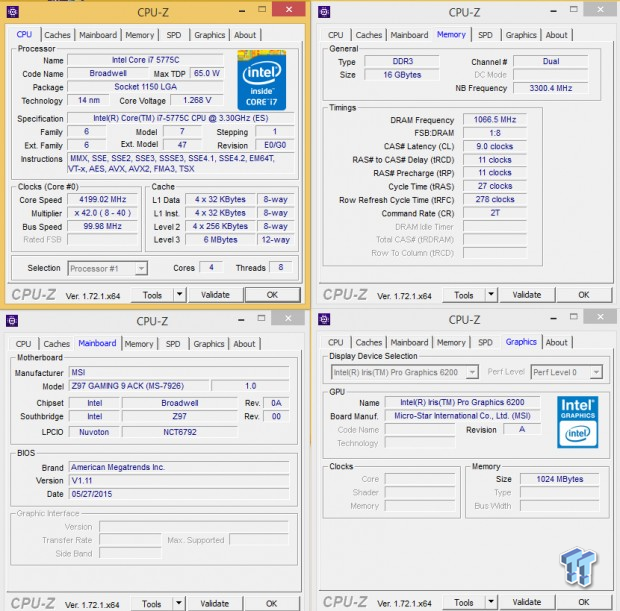
In the end, I was able to run 4.2GHz with decent stability and 4.0GHz will full stability. In fact, I ran my entire benchmark suite at 4.0GHz with 2133MHz on the memory. It was relatively easy to overclock the memory to 2133MHz. On some Z97 motherboards, I have seen that the memory multiplier is limited to 21.33x or 28.00x, but on this MSI motherboard, it went all the way up to 32.00x. The eDRAM can overclock up to 20x multiplier and the iGPU up to 60x multiplier.
The bottom line is that you probably won't be getting the same overclocks as Haswell. That being said, you can overclock to 4.0-4.2GHz stable with a modest memory overclock, and you can overclock the iGP. You need to be careful if you use the BLCK divider, you will need reduce the multipliers, especially the cache ratio.
Power Consumption
For measuring the CPU power consumption, I used an inline DC/DC Hall Effect monitoring IC to monitor the input on the 8-pin power connector, which should be isolated for CPU use only. This is one area where the 5775C shines bright.
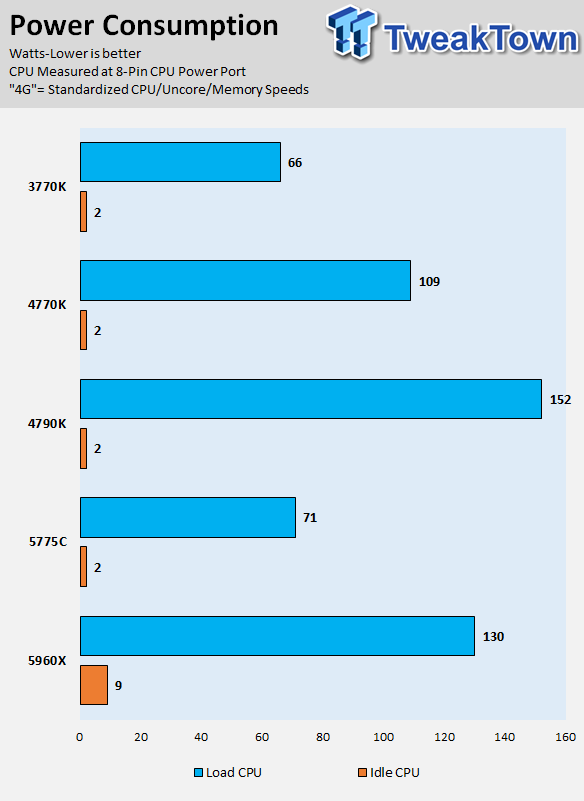
Broadwell and Haswell both have an integrated voltage regulator and all CPU power comes from the 8-pin. However, Ivy Bridge has some of its power coming from the 24-pin as well for the other voltage rails other than CPU and iGP. Overall, Broadwell really shines bright; its power consumption at a 200MHz lower core clock is significantly better than Haswell.
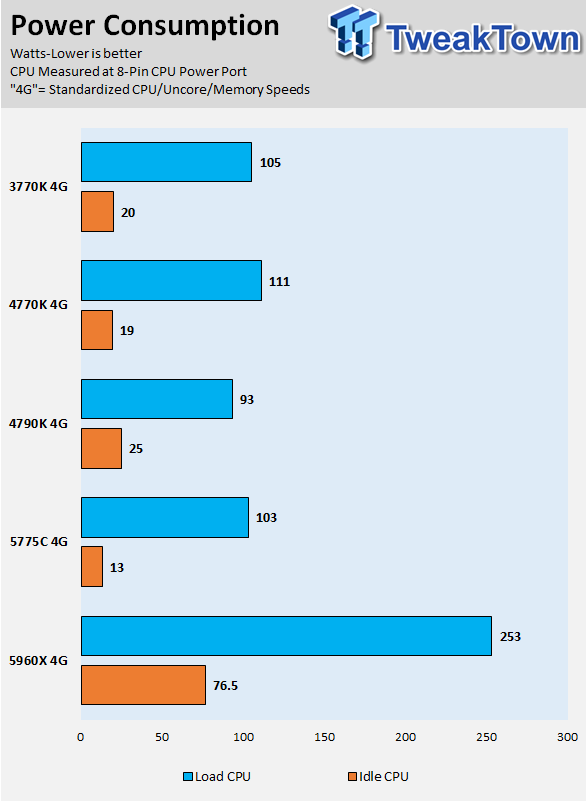
For this test, I ran the systems with the same voltage settings and frequency parameters for both the CPU and Memory and I setup the BIOS to push a 4.0GHz overclock at all times. Broadwell's idle power consumption is very low, which is a great thing considering it has that Iris Pro iGP.
At full load, it is a bit higher than the 4790K, but that is because the 4790K is a binned overclocking optimized CPU underclocked by 400MHz of its maximum turbo speed and the 5775C is overclocked 300MHz more than its maximum turbo speed. A more fair measurement of power is when the 5775C is compared to the 4770K, where there does seem to be significant power savings.
What's Hot, What's Not & Final Thoughts
Page 12[What's Hot, What's Not & Final Thoughts]
This is where you can fast forward to the final section of the review, and get a quick recap and points on the Intel i7-5775C.
What's Hot
Intel Delivered What the Community Demanded: Almost three years ago news broke that Broadwell would only be BGA, and not be a socketed desktop CPU. The community protested and Intel took note, and now they have delivered. The launch of the 5775C and 5675C shows that the community can make a difference. Intel should be applauded for listening to the DIY market. Even better, Intel made strides to provide Iris Pro and unlocked CPU in the same package.
Fully Unlocked CPU with Powerful Iris Pro Graphics and eDRAM: This is the first time Intel has paired an Iris Pro iGP core with an unlocked CPU. That is not to say you cannot overclock and tweak the iGP, you definitely can. The 5775C is a perfect fit for those who need a less expensive graphics solution, but not just the bare minimum.
Low Power Operation: Broadwell is great with power efficiency, especially considering the Iris Pro iGP. The die shrink, modified FIVR, and overall mobile design results in lower power consumption in the same performance envelope when compared to the 4770K. Broadwell also has a new standby power supply for very low power standby operation.
Excellent Integrated Graphics Performance: The integrated graphics might be one of the most powerful in the world (I haven't reviewed AMD's latest offering yet though). It's leaps ahead of the typical Intel HD series integrated graphics found on other unlocked CPUs. The Iris Pro 6200 with 128MB eDRAM helps to further bridge the gap between integrated graphics and discrete graphics for light gaming. The iGP implementation on the 5775C makes sub $100 discrete video cards pretty much obsolete. It also can be overclocked.
Overall good performance: While the 4770K is 200MHz faster and has 2MB more cache, the 5775C has much lower power consumption with much beefier graphics and performs pretty much head to head when both CPUs are clock for clock. Broadwell is less about IPC improvements and more rather about fine-tuning the CPU to maintain performance with a significantly lower power envelope.
What's Not
Lower Overclocking Margins than its Predecessor: While Intel listened to the consumer and did its best to modify Broadwell by unlocking it and optimizing the CPU for the desktop, overclocking margins aren't what many expected. While you will be able to hit that 4GHz-4.2GHz mark, going far north of it can be cumbersome. You shouldn't expect the crazy memory overclocks that Haswell provided, rather modest ones using XMP. Ticks don't always overclock as well as Tocks, and while Broadwell is an example of this, it isn't alone. Ivy Bridge also had overall lower overclocks than Sandy Bridge.
Timing: While Intel launched the 5775C and 5675C SKUs at Computex, they also announced that the next generation 100 series platform would be coming this year. This puts the 5775C and 5675C in a tight spot, as many are intrigued by what Intel has to offer later this year.
Final Thoughts
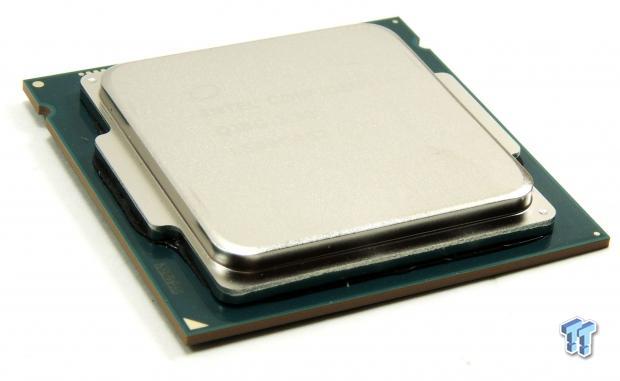
The price of the 5775C is higher than the 4770K and 4790K, but I think that is justified with the Iris Pro graphics. One thing is clear, if you need that iGP to be fast, then Intel's 5775C is perfect fit for you, but if you are looking for high overclocks and you will use a discrete GPU, then perhaps it might not be the best fit.
The elephant in the room is that many overclockers and DIY enthusiasts never use integrated graphics, but there is a large portion of the population that uses the iGP. You shouldn't think of the 5775C as an overclocking CPU with high-end integrated graphics, but rather as an efficient and fast desktop CPU that happens to allow tweaking and carries a powerful integrated graphics processor.

 United
States: Find other tech and computer products like this
over at
United
States: Find other tech and computer products like this
over at  United
Kingdom: Find other tech and computer products like this
over at
United
Kingdom: Find other tech and computer products like this
over at  Australia:
Find other tech and computer products like this over at
Australia:
Find other tech and computer products like this over at  Canada:
Find other tech and computer products like this over at
Canada:
Find other tech and computer products like this over at  Deutschland:
Finde andere Technik- und Computerprodukte wie dieses auf
Deutschland:
Finde andere Technik- und Computerprodukte wie dieses auf